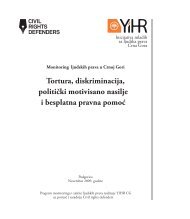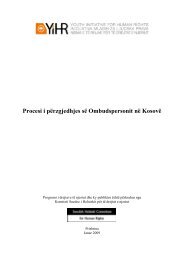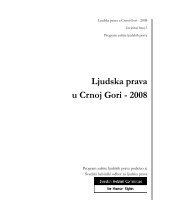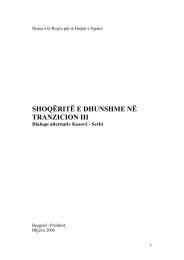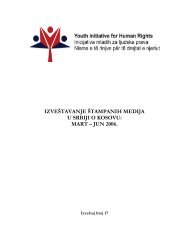Implementation of Transitional Laws in Serbia 2006
Implementation of Transitional Laws in Serbia 2006 - Archive
Implementation of Transitional Laws in Serbia 2006 - Archive
- No tags were found...
You also want an ePaper? Increase the reach of your titles
YUMPU automatically turns print PDFs into web optimized ePapers that Google loves.
<strong>Implementation</strong> <strong>of</strong> <strong>Transitional</strong> <strong>Laws</strong> <strong>in</strong> <strong>Serbia</strong> <strong>2006</strong>Evaluation <strong>of</strong> the Degree <strong>of</strong> theRule <strong>of</strong> Law <strong>in</strong> <strong>Serbia</strong>In <strong>2006</strong>, the tendency to disobey transitional laws and the derogation<strong>of</strong> <strong>in</strong>stitutions <strong>in</strong> <strong>Serbia</strong> has been cont<strong>in</strong>ued. In this way, GovernmentalRepresentatives cont<strong>in</strong>ue to underm<strong>in</strong>e the rule <strong>of</strong> law and the legal state<strong>in</strong> <strong>Serbia</strong>.The new Constitution seriously underm<strong>in</strong>es the achieved level <strong>of</strong> humanand m<strong>in</strong>ority rights, what is strictly prohibited, both by the domesticlegislature, and by <strong>in</strong>ternational legal norms. The Constitution does notprovide regional autonomy for Vojvod<strong>in</strong>a, places the terms <strong>of</strong> ParliamentaryRepresentatives <strong>in</strong> the hands <strong>of</strong> political parties and does not enable thecomplete <strong>in</strong>dependence <strong>of</strong> Court authorities. Adopt<strong>in</strong>g the highest legalact without any k<strong>in</strong>d <strong>of</strong> public discussion and the Referendum campaigndur<strong>in</strong>g which numerous legal norms were violated seriously questions thelegality <strong>of</strong> the Constitution.The implementation <strong>of</strong> the Law on Free Access to Information is still onlypartial; public authority organs do not fully obey the regulations <strong>of</strong> thislaw. Amongst those organs which have broken this law <strong>in</strong> <strong>2006</strong>, there arealso M<strong>in</strong>istries <strong>of</strong> the Government <strong>of</strong> the Republic <strong>of</strong> <strong>Serbia</strong>. Particularlyparadoxical is the fact that the M<strong>in</strong>istry <strong>of</strong> Culture, <strong>in</strong> whose job descriptionit is to control the implementation <strong>of</strong> this law, has also broken the law.Trials based on the Law on War Crimes Prosecution have been cont<strong>in</strong>uedbefore the War Crimes Chamber <strong>of</strong> the Regional Court <strong>in</strong> Belgrade.Problems fac<strong>in</strong>g the prosecutors and the courts <strong>in</strong>clude <strong>in</strong>sufficient f<strong>in</strong>ancialassistance from the Government, and the new crim<strong>in</strong>al legislature, whichdef<strong>in</strong>es command responsibility as a separate crim<strong>in</strong>al act.Despite the existence <strong>of</strong> regulations with<strong>in</strong> the Law on Public Information,which forbids hate speech, such speech is still present <strong>in</strong> the media andthere are no examples <strong>of</strong> its sanction<strong>in</strong>g. The Youth Initiative for HumanRights has brought two charges for hate speech aga<strong>in</strong>st daily newspapers,GLAS JAVNOSTI and KURIR. The charges aga<strong>in</strong>st KURIR have beendenied <strong>in</strong> a first-degree process. The further process<strong>in</strong>g <strong>of</strong> these chargeswill be a clear <strong>in</strong>dicator <strong>of</strong> whether the courts <strong>in</strong> <strong>Serbia</strong> are will<strong>in</strong>g to f<strong>in</strong>allydeal with hate speech <strong>in</strong> the media.



